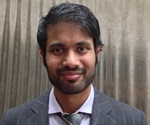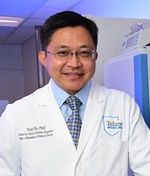This webinar was recorded live on April 19, 2023.
It is available on demand through April 30, 2024.
Register above for access.
Description
Accelerating the preventive drug treatment of people infected with latent tuberculosis (LTBI) is a high priority to eradicate TB disease. New diagnostic tests are urgently needed to screen LTBI and determine who will progress to active TB disease. Phage-based diagnostics have the ability to differentiate between active and past Infections. The changing paradigm of the spectrum of TB infection, incipient TB, and the progression to active TB will be addressed. A broader understanding of the LTBI diagnostic landscape is needed to support wider implementation of LTBI treatment with new diagnostics.
In this webinar, Drs. Haldar and Hu discuss the epidemiology of TB and limitations of current tests that look at host response. They explain how phage-based diagnostics enable direct detection of the pathogen in the blood, providing the opportunity to determine incipient/subclinical disease. Recent clinical trials will also be discussed.
Target Audience
This activity is designed for physicians, lab supervisors, lab directors (and/or assistant directors), lab managers (supervisory and/or non-supervisory), medical technologists, pathologists, fellows, residents, in-training individuals, and other laboratory professionals overseeing/conducting within this topic.
Learning Objectives
After attending this session, participants will be able to:
- Summarize the epidemiology of TB.
- Explain the limitations of current tests that look at host response.
- Describe recent evidence supporting the existence of circulating mycobacterium tuberculosis (Mtb) in both infection and disease that could provide a basis for developing pathogen directed biomarkers.
- Describe how phage-based diagnostic technology can be used to detect incipient and active TB.
Faculty
 Pranabashis Haldar, PhD
Pranabashis Haldar, PhD
Clinical Senior Lecturer and Consultant Respiratory Physician
Clinical Lead for TB Services
University of Leicester
Leicester, UK
 Tony Hu, PhD
Tony Hu, PhD
Weatherhead Presidential Chair in Biotechnology Innovation
Director, Center for Intelligent Molecular Diagnostics
Professor of Biochemistry and Molecular Biology, Microbiology, and Biomedical Engineering
School of Medicine, Tulane University
New Orleans, LA
DISCLOSURES AND STATEMENT OF INDEPENDENCE
The Association for Diagnostics & Laboratory Medicine (formerly AACC) is dedicated to ensuring balance, independence, objectivity, and scientific rigor in all educational activities. All participating planning committee members and faculty are required to disclose to the program audience any financial relationships related to the subject matter of this program. Disclosure information is reviewed in advance in order to manage and resolve any possible conflicts of interest. The intent of this disclosure is to provide participants with information on which they can make their own judgments.
The following faculty reported relevant financial relationship(s) during the content development process for this activity:
- Pranabashis Haldar, PhD
- Advisory Board Member for PBD Biotech
- Tony Hu, PhD
- Co-founder, Nanopin Technologies Co., Phoenix, AZ USA
- Co-founder, IntelliGenome Co., New Orleans, LA USA
- IP royalty received from Raisecare Biotech Co., China
- Boehringer-US RFP IIS2020-0178 (Lasky, Tulane)
- Several federally funded grants
CONTENT VALIDITY
All recommendations involving clinical medicine are based on evidence accepted within the profession of medicine as adequate justification for their indications and contraindications in the care of patients; AND/OR all scientific research referred to or reported in support or justification of a patient care recommendation conforms to generally accepted standards of experimental design, data collection, and analysis.
ACCREDITATION STATEMENT
This activity is approved for 1.0 ACCENT® continuing education credits. Activity ID# 4193. This activity was planned in accordance with ACCENT® Standards and Policies.
SUCCESSFUL COMPLETION STATEMENT
Verification of Participation certificates are provided to registered participants based on completion of the activity, in its entirety, and the activity evaluation. For questions regarding continuing education, please email [email protected].